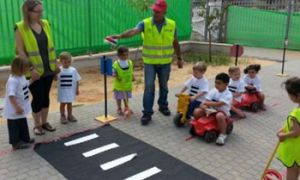

Saying sorry is among the earliest lessons in interpersonal behaviour that children learn when growing up. There are indeed many benefits of an apology but sometimes we forget that almost always they depend on both sides genuine feeling the emotions rather than being forced to go through the motions. The following article provides information on the Importance Of Apologising and Strategies To Support Children In Saying Sorry.
Parents may be barred from hitting their children after a study found that physical punishment increased the chance of anxiety.
The Yoga Poses For Children Posters illustrate 16 different yoga poses/asanas for children to practice. Each poster demonstrates the child's yoga pose/asana, followed by the yoga pose name in English and Sanskrit. These are great to be used as a display or refer to when teaching children.
When children practise yoga it increases their confidence, builds concentration and strengthens growing bodies. For children with behavioural issues, yoga can improve their impulses in a positive direction and provides them with an outlet as a way to manage their behaviour.
Young children who are not able to develop age-appropriate strategies for regulating aggressive behaviour are at high risk for engaging in chronic aggressive and antisocial behaviour which might adversely affect all aspects of their future lives. Also physically aggressive behaviour has the potential to disrupt the learning environment and even cause harm to others, both children and adults, in the setting. The following article provides information on Strategies To Deal With Specific Types Of Physical Aggression, General Strategies and Long Term Strategies For Physical Aggression and more.
The Don't Say Good Job Posters have a variety of different phrases that can be used in different situations with children, instead of saying "good job". These are helpful in reminding Educators of positive phrases to use when talking and engaging with children. These can also be given to parents in order for them to engage in conversation with their children.
The Words Matter Posters are a reminder of using positive language when talking to children. It shows positive phrases to use when guiding children's behaviour. These are great to use as a reminder for Educators on how to talk to children.
A free recorded webinar on Positive Behaviour Support is available for Educators to watch. Regional Coordinators for Inclusion Support at One Tree Community Services answered questions about Positive Behaviour Support.
Active Listening involves lending your undivided attention to someone who is speaking to you. As opposed to passive listening which is merely hearing the speaker without trying to understand what is being said, active listening leads to more effective communication, learning and problem-solving. The article provides information on What Active Listening Is, Active Listening Definition, Active Listening Skills Examples and more.
It is very true and often happens to almost every parent that they have to put so much energy and physical strength to raise a child that often they feel there is nothing more left to give and feel exhausted. And exactly at that moment of time Cocomelon, the famous youtube rhyming channel comes into the picture. It holds the child for half hr or so and distracts them from the world around them which gives the parents an opportunity to have sanity on their own. But are these harming your children? Is it the cause of speech delay and is it the reason for tantrums that your child is showing and developing recently?
In early childhood, among the most important aspects of learning self-regulation is the ability to identify and label emotions. Unless children are able to understand and manage their emotions, they might end up expressing them through negative and disruptive behaviours. In this context, the Zones of Regulation approach offers valuable support to children’s efforts to recognise and manage their own emotions.
 As an Educator in Australia, your pay rate falls under the Children’s Services Award 2010. This award states the minimum amount that an employer can… Read More
As an Educator in Australia, your pay rate falls under the Children’s Services Award 2010. This award states the minimum amount that an employer can… Read More
 When working as a qualified Early Childhood Teacher (with a university degree) within a service, your rate of pay will come from the Educational Services… Read More
When working as a qualified Early Childhood Teacher (with a university degree) within a service, your rate of pay will come from the Educational Services… Read More
 When working as a Diploma Qualified Educator your pay rate is from the Children's Services Award 2010. This Award states your minimum rate of pay… Read More
When working as a Diploma Qualified Educator your pay rate is from the Children's Services Award 2010. This Award states your minimum rate of pay… Read More
 When working as a Cert 3 Qualified Educator, your pay rate is from the Children's Services Award 2010. This Award states your minimum rate of… Read More
When working as a Cert 3 Qualified Educator, your pay rate is from the Children's Services Award 2010. This Award states your minimum rate of… Read More
 Educational Leaders play a crucial role in their early childhood service by ensuring that the educational program aligns with best practices and supports the holistic… Read More
Educational Leaders play a crucial role in their early childhood service by ensuring that the educational program aligns with best practices and supports the holistic… Read More
 In early childhood education and care, ratios are more than a technicality—they are a frontline safeguard. Every child deserves responsive supervision, emotional connection, and developmental… Read More
In early childhood education and care, ratios are more than a technicality—they are a frontline safeguard. Every child deserves responsive supervision, emotional connection, and developmental… Read More
 With the new national child safety reforms kicking in on 1 September 2025, early childhood services like yours have a real opportunity to lead the… Read More
With the new national child safety reforms kicking in on 1 September 2025, early childhood services like yours have a real opportunity to lead the… Read More
 Here’s a comprehensive Mobile Phone and Smart Watch Policy tailored for early childhood education and care (ECEC) services in Australia, aligned with the latest 2025… Read More
Here’s a comprehensive Mobile Phone and Smart Watch Policy tailored for early childhood education and care (ECEC) services in Australia, aligned with the latest 2025… Read More
 The Sea of Fish Challenge is a national initiative that invites children, educators, families, and communities to create and display fish artworks as a symbol… Read More
The Sea of Fish Challenge is a national initiative that invites children, educators, families, and communities to create and display fish artworks as a symbol… Read More
 Across the early childhood education and care sector, educators are sounding the alarm: current staffing ratios are insufficient to deliver safe, meaningful, and developmentally appropriate… Read More
Across the early childhood education and care sector, educators are sounding the alarm: current staffing ratios are insufficient to deliver safe, meaningful, and developmentally appropriate… Read More

Self-regulation can be understood as a suite of skills needed to control and manage one’s...
See more...
Writing critical reflections for the National Quality Standards (NQS) in early childhood education involves a...
See more...
One of the most important concepts we can introduce to children is road safety. Road...
See more...© 2009-2025 Aussie Childcare Network Pty Ltd. All Rights Reserved.

